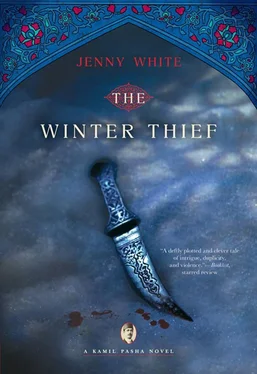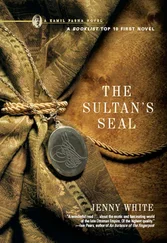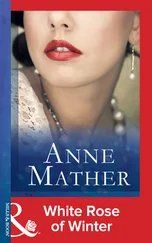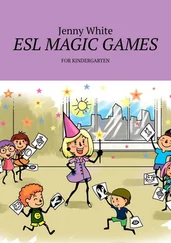Jenny White - The Winter Thief
Здесь есть возможность читать онлайн «Jenny White - The Winter Thief» весь текст электронной книги совершенно бесплатно (целиком полную версию без сокращений). В некоторых случаях можно слушать аудио, скачать через торрент в формате fb2 и присутствует краткое содержание. Жанр: Исторический детектив, на английском языке. Описание произведения, (предисловие) а так же отзывы посетителей доступны на портале библиотеки ЛибКат.
- Название:The Winter Thief
- Автор:
- Жанр:
- Год:неизвестен
- ISBN:нет данных
- Рейтинг книги:5 / 5. Голосов: 1
-
Избранное:Добавить в избранное
- Отзывы:
-
Ваша оценка:
- 100
- 1
- 2
- 3
- 4
- 5
The Winter Thief: краткое содержание, описание и аннотация
Предлагаем к чтению аннотацию, описание, краткое содержание или предисловие (зависит от того, что написал сам автор книги «The Winter Thief»). Если вы не нашли необходимую информацию о книге — напишите в комментариях, мы постараемся отыскать её.
The Winter Thief — читать онлайн бесплатно полную книгу (весь текст) целиком
Ниже представлен текст книги, разбитый по страницам. Система сохранения места последней прочитанной страницы, позволяет с удобством читать онлайн бесплатно книгу «The Winter Thief», без необходимости каждый раз заново искать на чём Вы остановились. Поставьте закладку, и сможете в любой момент перейти на страницу, на которой закончили чтение.
Интервал:
Закладка:
Jenny White
The Winter Thief
Istanbul
CHRISTMAS DAY, JANUARY 6, 1888
The elderly publisher put on his spectacles to examine the enameled pin in his hand. It displayed a symbol of broken chains draped across a sword, an ax, and a red flag. He handed the pin back to the young woman as if it were poison.
Vera had gotten lost in the twisted lanes leading to Bab-i Ali, the publishing district, and ended up down by the harbor, then had to work her way back up the hill on the boulevard, where she might be seen. But she had been late for her meeting with the publisher and didn’t want to risk getting lost again. It was only five o’clock, but already dark from the approaching storm. The street was nearly deserted. The few men she passed were wrapped up against the cold, and she could see only their eyes. As she approached the center of the district, the buildings became more substantial, with ornate porticos, but their windows were blank, reflecting back the gray sky. All the Armenian businesses were closed for Christmas. Her own family’s house in Moscow would be blazing with warmth and light, Vera thought with a pang of regret. She hurried along Jalaloglu Street, peering at the names across the entrances, and finally, gratefully, turned into a doorway marked Agopian Brothers Publishing House.
Now Vera was sitting in a chair before the publisher’s desk. Curls of auburn hair, darkened by moisture, stuck to her cheeks. He reminded her of her grandfather, whom she remembered sitting at a desk much like this one, waiting impatiently for his granddaughter to speak her mind. The logs in the fireplace throbbed deep red. Shelves were crammed with books, and a long table was heaped with manuscripts. The publisher’s desk, however, was as organized and tidy as the man himself. Vera noticed a vase of pine boughs in a window niche. Beside it lay a pomegranate, symbol of luck in the New Year.
“I’m sorry to interrupt you on Christmas Day,” she said, pocketing the pin, the symbol of the Armenian socialist Henchak organization. “But I wanted the chance to speak to you alone. Thank you for coming to your office.”
“I wish you a blessed Christmas, my daughter. What can I do for you?” They spoke in Armenian, his voice cultured and precise, hers heavily accented. Her parents had spoken only Russian at home. What she knew of the language, she had learned from her grandmother and, later, from fellow Armenian students studying in Geneva.
Vera reached inside her coat and pulled out a manuscript. She placed it on the desk between them.
“ The Communist Manifesto .” The publisher read the title out loud. “By Karl Marx and Friedrich Engels.” He flipped through the pages. “It’s in Armenian.”
“Exactly.”
“You want me to publish this?”
“Yes.”
“Look here, Madame…What did you say your name was?”
“Lena,” she lied. “Lena Balian,” using the name of a childhood friend in Moscow. “Will you do it?”
A look of irritation passed over his face, disguised immediately by official blandness.
“Explain to me why I should publish this.”
“It’s the duty of educated Armenians like us to protect those of our people who are vulnerable, the peasants and the workers.” Her words sounded hollow and rehearsed. She wished she had Gabriel’s eloquence. He had grown up in the shipyards of Sevastopol and had acquired his many languages in the cauldron of the street. She had studied at a privileged academy in Moscow, but what had she learned that was useful? “The Armenian people will find the strength to resist oppression only by joining the International Movement, by standing shoulder to shoulder with other oppressed peoples around the world.”
Her face was flushed from the overheated room. “The Manifesto has already been translated into English, French, Russian, Spanish, Polish, and Danish. It’s a scandal that there’s no Armenian translation.”
The publisher placed his spectacles on the desk and said gently, “Madame Balian, I appreciate your sentiment, and to some extent I agree that we need to stand together, but from what I’ve heard, this is the stuff of sheer anarchy. If you remove the state altogether, do you really think men will support one another from the goodness of their hearts?” He shook his head. “No, I don’t agree. If you remove the state, they’ll rush to tear out each other’s throats.”
“They’ll do that anyway. This way we can resist. There’s strength in numbers.”
“Something has to hold people together, madame. We’re Armenians. That’s enough. We don’t need someone else’s utopia.”
“An Armenian landlord has more in common with a Turkish agha than with the peasants plowing his fields. The fact that landlord and peasant share the same nationality is irrelevant. It doesn’t mean the landlord will treat his workers any better. Peasants have to stand together, no matter if they’re Turk or Armenian. Nationality divides people; socialism unites them.”
“Where is your family on this Christmas Day?” the publisher asked gently.
Vera was startled by the sudden change in subject. “My family? In Moscow.” The revelation made her feel vulnerable.
“Are you not a member of the landed class yourself?”
“Why would you think that?”
“Your clothing, the way you speak. You’ve had a good education. Perhaps in Moscow it means something different to be an Armenian than here in the empire.”
“What do you mean?”
“Maybe in Moscow you have the luxury of being Armenian however you choose-by going to church, or speaking the language, or just baking cheoreg. But here we Armenians have a common fate, peasant and landlord alike.”
“Fate,” she repeated. “That sounds very Oriental. What use is a life without struggle?”
“Ah, madame, we have enough struggle to satisfy several generations. We are not short of struggle.”
“I mean, struggle for a better society where everyone is equal, where no one starves just because they don’t own any land.”
“Everyone wants to offer us a utopia,” he said sadly. “No one offers us peace.”
Vera hesitated. The conversation was becoming too philosophical, and philosophy, like poetry, had no end. “What harm would it do to publish this?” she asked. “If, as you say, Armenians don’t exploit each other…”
“I never said that,” he interrupted.
“If Armenians are united despite their differences, then this would link them to something greater. Do you want to deprive the Armenian people of their right to participate in the greatest global movement of the century?”
He thought about that, drumming his fingers on the manuscript. “I’m not averse to publishing this text, but I can’t publish it under the names Karl Marx and Friedrich Engels. It would be immediately recognized by the Ottoman government for what it is-socialist propaganda. My publishing house would be closed down, perhaps worse. Then what have we gained?”
“What are you saying? That you’ll publish it anonymously?”
He shrugged. “We could publish it under your name instead.”
“Then it would be seen as Russian propaganda.”
“A woman’s name is less dangerous.”
“That would be like sending a man into battle with a blunt sword.” She rose abruptly, stifling her disappointment. “Please reconsider,” she pleaded.
“Madame Balian, you must know that Russia is threatening the empire’s eastern provinces,” he said with thinly disguised exasperation. “The sultan suspects us Armenians of collaborating with them. This is not the time to publish Marx’s work here.” He held out the manuscript, refusing to meet her eyes.
She stuffed the papers into her coat, her face stern so he wouldn’t notice the tears. Her gloves fell unnoticed to the floor.
Читать дальшеИнтервал:
Закладка:
Похожие книги на «The Winter Thief»
Представляем Вашему вниманию похожие книги на «The Winter Thief» списком для выбора. Мы отобрали схожую по названию и смыслу литературу в надежде предоставить читателям больше вариантов отыскать новые, интересные, ещё непрочитанные произведения.
Обсуждение, отзывы о книге «The Winter Thief» и просто собственные мнения читателей. Оставьте ваши комментарии, напишите, что Вы думаете о произведении, его смысле или главных героях. Укажите что конкретно понравилось, а что нет, и почему Вы так считаете.












